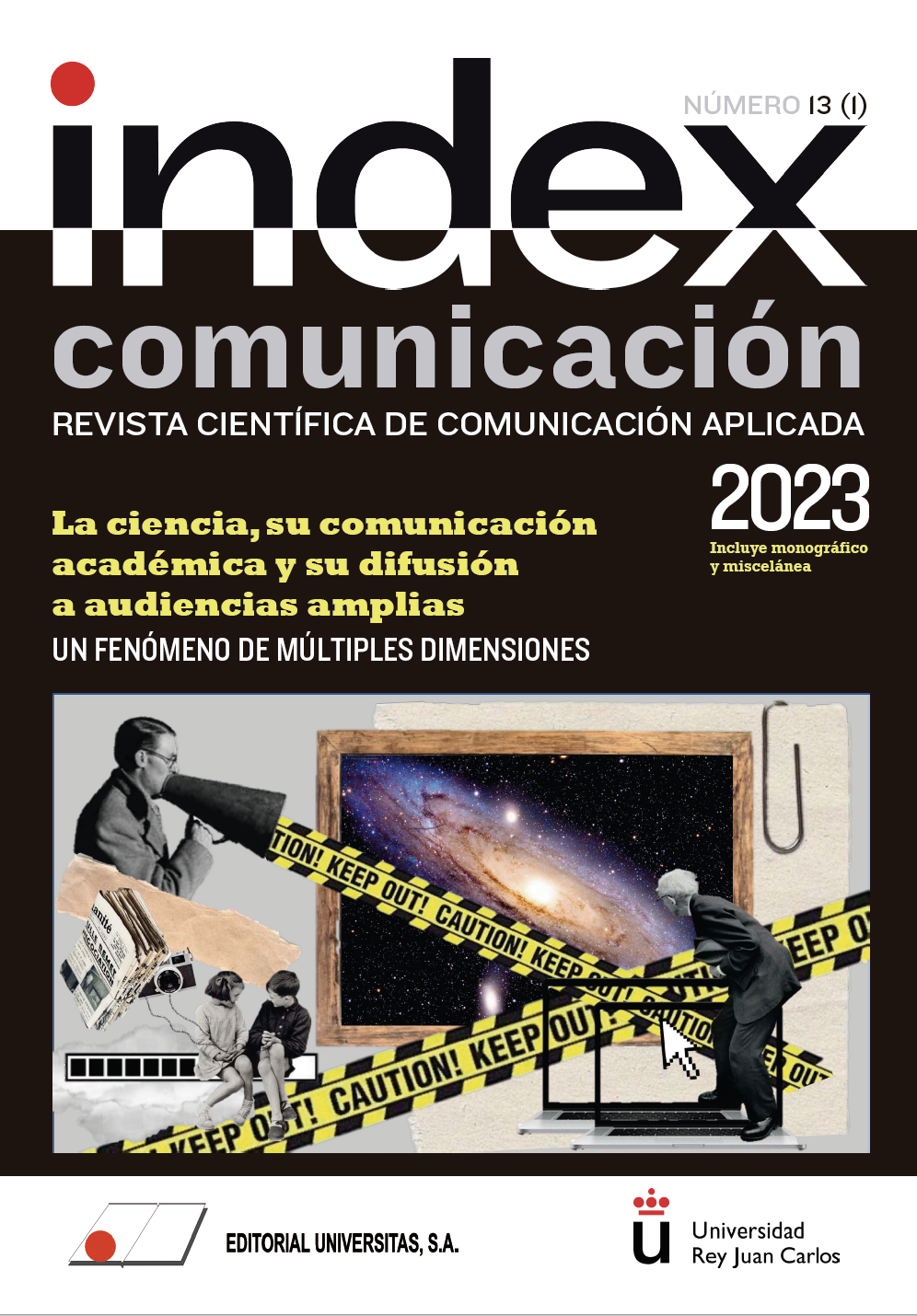Brand Activism from the Academic, Professional and Consulting Perspective
DOI:
https://doi.org/10.33732/ixc/13/01ElactiKeywords:
Brand Activism, Consumers, Advertising, Social Marketing, Social ChangeAbstract
Brand Activism consists of corporate efforts to promote, prevent or direct social, political, economic and/or environmental reform or stagnation with the desire to promote or prevent social improvements (Sarkar y Kotler, 2018). This research aims to shed light on this tool from the point of view of three sectors: the academic, the professional and the consultant, with a methodology based on the in-depth interview technique applied to 28 professionals, and the use of the ATLAS.ti program. The conclusions that have been reached are revealing: brand activism is a long-term, transversal and strategic strategy, with external and internal impact of a reactive nature (it aims to solve a problem that already exists) and aimed at consumers ¾because they want to position the brand favorably before them based on their activism¾ but also aimed at society in general. A powerful tool whose use still has a long way to go in our country.
Metrics
References
ADKINS, S. (1999). Cause Related Marketing. Who cares wins. Butterworth-Heinemann. https://doi.org/10.1016/B978-0-7506-4481-5.50023-2
ACCENTURE (2018). To affinity and beyond. From me to we, the rise of the purpose-led brand.
ALMEIDA GARCÍA, D. (2021). Del marketing social al activismo de marca. (2021). En MARTÍN MARTÍN, I. (Ed.), Manual de finanzas sostenibles: un enfoque multidisciplinar (págs. 47-60). Cátedra Finanzas Sostenibles.
BÉCARES, G. (21 de febrero 2020). Newashing ¿todas las marcas son benetton? ESPECIAL para 'Mucho por hacer' Marcas con Valores. Ethic. https://ethic.es/2020/02/newashing-todas-las-marcas-son-benetton/
BENAVIDES DELGADO, J., ALAMEDA, D., FERNÁNDEZ BLANCO, E., LÓPEZ DE AGUILETA CLEMENTE, C. (2019). Observatorio de la Publicidad. Tendencias 2019. anunciantes.com. https://cutt.ly/tXbo4Jh
BRAUN, V., & CLARKE, V. (2006). Using thematic analysis in psychology. Qualitative research in psychology, 3(2), 77-101. https://doi.org/10.1191/1478088706qp063oa
BRISCOE, F., GUPTA, A. (2016). Social Activism in and Around Organizations. Academy of Management Annals, 10, 671-727. https://doi.org/10.5465/19416520.2016.1153261
CODELUPPI, V. (2007). El papel social de la publicidad/The social role of advertising. Pensar la publicidad, 1(1), 149. https://core.ac.uk/download/pdf/38818499.pdf
CÓRDOBA LÓPEZ, J.F. (2009). Del marketing transaccional al marketing relacional. Entramado, 5(1), 6-17. https://tinyurl.com/2p9h5677
CRESWELL, J. W. (2012). Educational research: Planning, conducting, and evaluating quantitative and qualitative research (4th ed.). Pearson. https://tinyurl.com/6mhacjn7
DAVIS, J. (27 de septiembre de 2016). When did Che Guevara become CEO? The roots of the new corporate activism. The conversation. https://tinyurl.com/5xzrjdj3
DELOITTE (2016). “The new principles of brand leadership: The 2016 Impact Project”. https://tinyurl.com/5n6wztd
DÍAZ SOLOAGA, C. (20 de febrero de 2017). Del storytelling al storydoing. ¡Lo que no te han contado! SEMRush Blog. https://cutt.ly/7XvmCmX
ECONOMIST IMPACT (21 junio 2019). How should brands continue to work with the social platforms? (Video). Wake Up with the Economist. Youtube. https://www.youtube.com/watch?v=x2PKNCw5Qgk
FONCILLAS, P. (21 de julio de 2020). Marcas que han ayudado en la pandemia... y otras que lo han hecho mal. La Vanguardia. https://tinyurl.com/5e45tzm3
FRANKLIN, C., BALLAU, M. (2005). Reliability and validity in qualitative research. En GRINNELL, R. & UNRAU, Y. (Eds.). Social work: Research and evaluation. Quantitative and qualitative approaches (pp.438-449). Oxford University Press.
GALÁN-LADERO, M., GALERA CASQUET, C., VALERO AMARO, V., BARROSO-MÉNDEZ, M. J. (2013). Sustainable, socially responsible business: the cause-related marketing case. A review of the conceptual framework. Journal of Security and Sustainability Issues, 2(4), 35-46. https://doi.org/10.9770/jssi.2013.2.4(4)
GÓMEZ AGUILAR, A. (2010). Análisis de la estructura de la personalidad de marca y sus efectos sobre la imagen y la lealtad: una aplicación al mercado turístico español. [Unpublished doctoral dissertation]. Universidad Autónoma de Madrid
GRÖNROOS, C. (1994). From Marketing Mix to Relationship Marketing: towards a paradigm shift in marketing, Management Decision, 32(12), 4-20. https://doi.org/10.1108/00251749410054774
HERNÁNDEZ SAMPIERI, R., FERNÁNDEZ COLLADO, C., BAPTISTA LUCIO, P. (2010). Metodología de la investigación. (5a. ed.). McGraw-Hill.
HERNÁNDEZ SAMPIERI, R., FERNÁNDEZ COLLADO, C., BAPTISTA LUCIO, P. (2014). Metodología de la investigación. (6a. ed.). McGraw-Hill.
ÍÑIGUEZ RUEDA, L (2009). Acción Colectiva. Módulo 2: Movimientos sociales: conflicto, acción colectiva y cambio social. UOC. FUOC, 2009. Cabruja i Ubach, T., Íñiguez Rueda, L., Muñoz Justicia, J. y Vázquez Sixto, F. https://tinyurl.com/yeyuwrm7
KAPFERER, J.N. (1997). Strategic Brand Management. Kogan Page.
KASSIRER, J., LEFEBVRE, C., MORGAN, W., RUSSELL-BENNETT, R., GORDON, R., FRENCH, J., SUGGS, L. S., LEE, N., y BIROSCAK, B. J. (2019). Social Marketing Comes of Age: A Brief History of the Community of Practice, Profession, and Related Associations, With Recommendations for Future Growth. Social Marketing Quarterly, 25(3), 209–225. https://doi.org/10.1177/1524500419866206
KOTLER, P., ROBERTO, N., LEE, N. (2002) Social marketing: Improving the quality of life. (2nd Ed.). Sage Publications Inc.
LÓPEZ ESCORIAL, M. (21 de enero de 2019) ¿Pueden las marcas ser activistas? Ocho ejemplos. El País. https://tinyurl.com/4k3ujsre
LUQUE DE MARCOS, S., BARAYBAR FERNÁNDEZ, M. (2018). Nuevas tendencias en la construcción de marcas: una aproximación al storydoing. Revista Prisma Social, Adolescencias y Riesgos: Escenarios para la Socialización en las Sociedades Globales, 23, 435-458. https://revistaprismasocial.es/article/view/2745/2930
MANFREDI-SÁNCHEZ, J.L. (2019). Brand Activism [El activismo político de las marcas]. Communication and Society, 32 (4), 343-359. https://doi.org/10.15581/003.32.4.343-359
MANFREDI SÁNCHEZ, J.L., SOLANILLA, P. (2 de diciembre de 2020). Influencia y competitividad en la nueva economía de la reputación: liderar con valores. Position Papers. Kerab. https://cutt.ly/zXzw2Ve
MERRIAM-WEBSTER (septiembre de 2017). Stay Woke. The new sense of 'woke' is gaining popularity. En Merriam-Webster.com Dictionary. Recuperado en 2021 en https://www.merriam-webster.com/words-at-play/woke-meaning-origin
OBSERVATORIO DE RESPONSABILIDAD SOCIAL CORPORATIVA (2014) Introducción a la Responsabilidad Social Corporativa.
https://observatoriorsc.org/la-rsc-que-es/
PINTADO BLANCO, T., SÁNCHEZ HERRERA, J, LÓPEZ AZA, C. (2020). Activismo corporativo ¿moda o estrategia de comunicación de marca? Havard Deusto Márketing y Ventas, 162, 6-13. https://cutt.ly/Z1WtNic
RAMOS E SILVA, J.A., PERIÁÑEZ CAÑADILLAS, I. (2003). Delimitación del Marketing con Causa o Marketing Social Corporativo mediante el análisis de empresas que realizan acciones de responsabilidad social. Cuadernos de Gestión, 3(1-2),65-82. https://addi.ehu.es/handle/10810/7076
ROJAS DE ESCALONA, B. (2010). Investigación cualitativa. Fundamentos y praxis. Ed. Fedupel.
SARKAR, C., KOTLER, P. (2018). Brand Activism: From Purpose to Action. Idea Bite Press.
VALLÉS, M.S (1997) Técnicas cualitativas de investigación social. Madrid. Síntesis
WIMMER, R. D., DOMINICK, J. R. (2011). Mass Media Research. An introduction. (9th ed.). Wadsworth. https://tinyurl.com/2uvsfkuw
Published
How to Cite
Issue
Section
License
Copyright (c) 2023 Susana Asenjo McCabe, Cristina del Pino Romero

This work is licensed under a Creative Commons Attribution-NonCommercial 4.0 International License.
Authors who submit to this journal agree to the following terms:
Authors retain copyright and ensure the magazine's right to be the first publication of the work as licensed under a Creative Commons Attribution-NoComercial 4.0 International License that allows others to share the work with an acknowledgment of authorship of the work and the initial publication in this magazine, with no commercial purpose.
Authors can establish separate additional agreements for non-exclusive distribution of the version of the work published in the magazine (for example, to an institutional repository or publish it in a book), with an acknowledgment of its initial publication in this journal.
It allows and authors are encouraged to disseminate their work electronically (eg, in institutional repositories or on their own website) prior to and during the submission process, as it can lead to productive exchanges, as well as a citation more early and most of the published work (See The Effect of Open Access).















